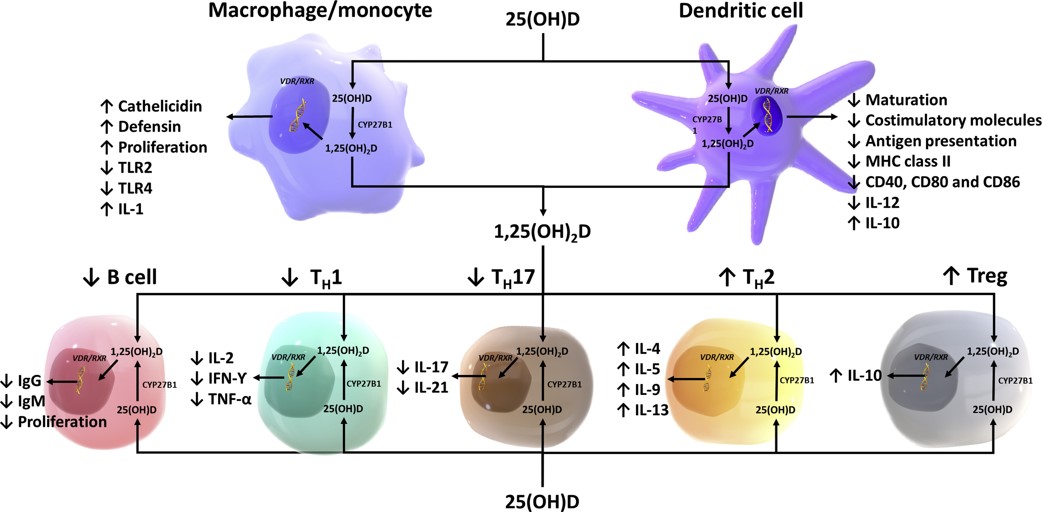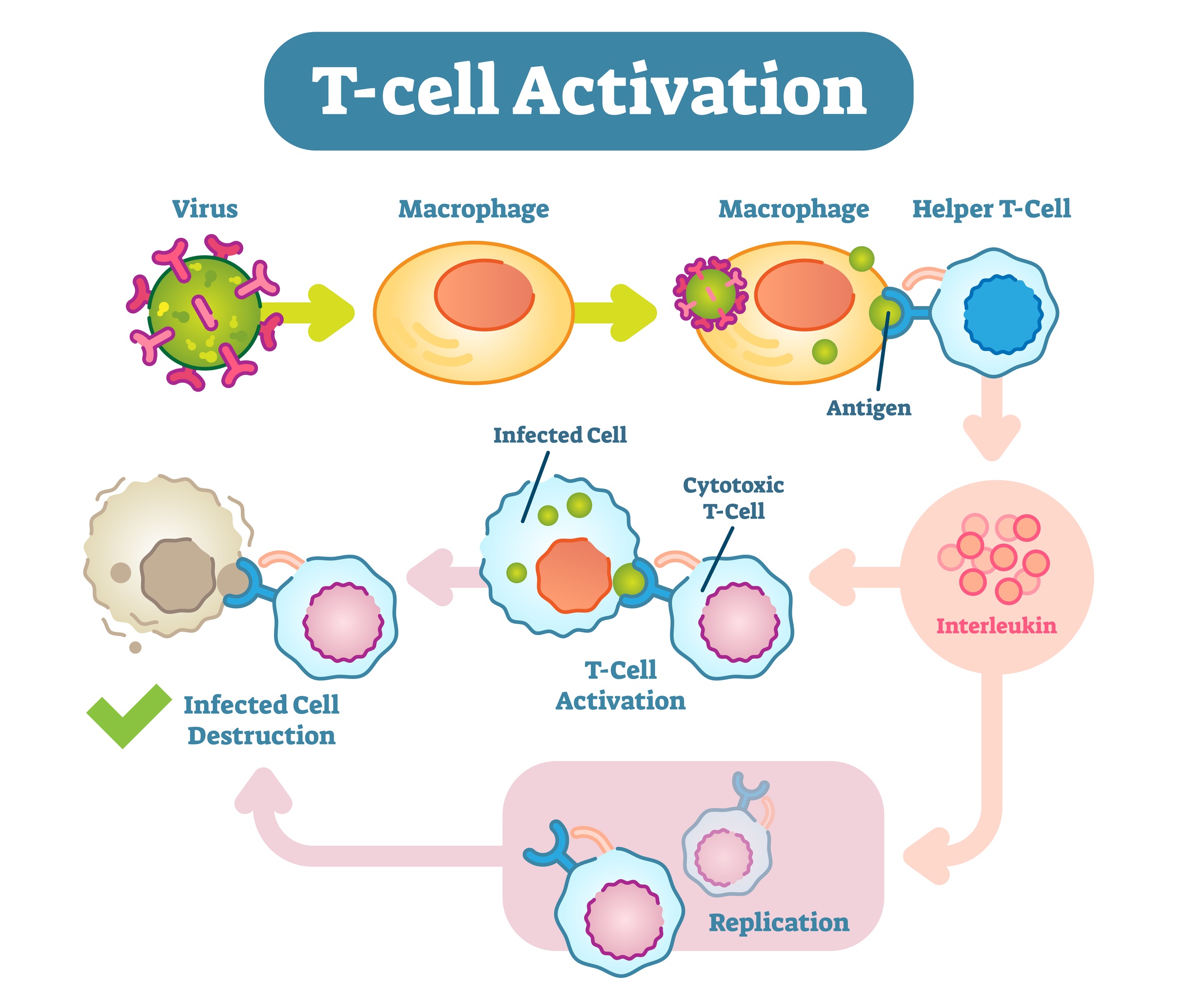How the Immune System Relies on Vitamin D

From GrassrootsHealth
What is Vitamin D Good For? (Part 9: Immune Health) – Vitamin D is needed by virtually every cell in the body, and is essential for hundreds of processes each and every day
 As part of our What is Vitamin D Good For? series, this post will attempt to summarize those roles to clearly show how the immune system relies on vitamin D to function properly. Because vitamin D acts as a protector and regulator of all cell types, tissues, and organs, it is required for the proper functioning of each system of the body to help keep us healthy. This is especially true for our immune system, since vitamin D has specific regulatory effects on immune cells and inflammation.
As part of our What is Vitamin D Good For? series, this post will attempt to summarize those roles to clearly show how the immune system relies on vitamin D to function properly. Because vitamin D acts as a protector and regulator of all cell types, tissues, and organs, it is required for the proper functioning of each system of the body to help keep us healthy. This is especially true for our immune system, since vitamin D has specific regulatory effects on immune cells and inflammation.
So far, we have covered how vitamin D contributes to the health of the musculoskeletal system, dermatological system, reproductive system, respiratory system, cardiovascular system, digestive system, and to cancer prevention and cognitive and mental-emotional wellness. A deficit in vitamin D can lead to impairment or disease in each of these systems – from brittle bones to heart disease, cancer and dementia. With this in mind, why take a chance at being deficient in vitamin D?
Summary of Overall Benefits of Vitamin D for Immune Health
Vitamin D functions in the immune system to:
- Regulate the activity of many immune cells including macrophages and monocytes, B-cells, and T-cells
- Supports the innate and acquired immune system
- Helps regulate inflammation, allergies and asthma
- Increases the presence and actions of anti-microbial peptides (cathelicidins and defensins) which act to disrupt microbial membranes, reduce viral replication, and inhibit the cytokine storm
- Increases white blood cells to fight infection
- Regulates immune system activity through modulating the expression of immune regulating genes
- Increases the expression of antioxidant defenses
- Increases the biodiversity of the gut microbiome, which has been shown to have protective effects against inflammation and respiratory tract infections
Immune-response diseases associated with low vitamin D
Vitamin D insufficiency has been associated with increased susceptibility to all types of infections. Vitamin D intake and blood levels have potential effects on disease risk, severity, and mortality. Infections that have been associated with low vitamin D levels include:
- Tuberculosis
- Influenza
- The “Common Cold”
- Leukemia
- Multiple Myeloma
- Urinary tract infections
- Allergies
- Asthma
- Respiratory tract infections
- Bacterial vaginosis
- COVID-19
What is Your Immune System?
Being exposed to viruses, bacteria, and toxins is a part of a normal day. They are in the air we breathe, the food we eat, in the water we drink and on surfaces we touch. Your immune system has been training since you were born to protect you from the “pathogens” that cause infection or disease. But sometimes, infection takes hold and your immune system has to fight off those pathogens. What you may not realize is that the nutrients in your diet directly influence the ability of your immune system to function.
There are two main immune reactions. The innate immune system works to stop the initial invasion of pathogens. It is the body’s first line of defense, and includes barriers such as our skin, mucous membranes, stomach acid, and microbiota, as well as the generalized inflammatory response. It is a quicker response that does not differentiate between pathogens – it just identifies that there is a problem, and works to eliminate it.
The adaptive immune reaction involves a more complicated, strategized set of actions to identify which pathogen has invaded and then create immune cells specifically designed to destroy that pathogen; a process that can take days to weeks – as is often the case with viral infections. The adaptive immune response can also use antigens to “remember” that specific pathogen which makes future responses more efficient.
Vitamin D Regulates Immune Cells and the Immune Response
Vitamin D plays a crucial role in regulating immune system activity – both innate and adaptive responses. The innate immune system is responsible for the initial defensive front with a central role played by phagocytes. Vitamin D stimulates expansion of these phagocytes (monocytes and macrophages), increasing their ability to fight off the virus by increasing their numbers, as well as increasing their killing capacity through stimulating the production of the anti-viral and anti-microbial protein cathelicidin. Vitamin D also acts to regulate the maturation of dendritic cells which are important for activating CD4+ T cells and in turn the rest of the immune response (see more below).
Vitamin D is a potent regulator of both cell-mediated (T cell) and humoral (B cell) immunity. This is a vital part of the body’s defense against pathogenic invader, allowing white blood cells to recognize, bind to, and destroy pathogens – a process that relies on vitamin D to function properly.
The diagram below outlines many specific ways vitamin D affects different immune cells of both the innate and adaptive immune response.

Charoenngam et al., Endocrine Practice, 2021.
Vitamin D Activates T-cells to Identify and Destroy Pathogens
Vitamin D is especially critical to the activation and modulation of T cells, which help identify and destroy pathogens. In this step, vitamin D becomes an essential component to how well the immune system responds to infection. T cells are able to directly and indirectly kill infected cells, depending on which type of T cell it is. There are several types of T cells that are important to a viral immune response, including helper T Cells (CD4+ T Cells) that help identify and direct the immune response, cytotoxic T cells (CD8 T Cells) that bind to and kill infected cells, and memory T cells that remember the pathogen and how to defeat it. Important to their function are the T cell receptors, which must be activated in order for the T cells to bind to the infected cells. Helper T cells also release specific proteins called cytokines (such as interleukin) in order to orchestrate the binding and activation of the T cells, ultimately causing the destruction of the infected cells.

Without sufficient vitamin D, these T cells are unable to become ‘activated’ and the immune system is more likely to become dysregulated, leading to increased inflammation and decreased efficiency of recovery.
Vitamin D Regulates Cytokines and Inflammation
Vitamin D acts to regulate T cell response through initiating dendritic cell tolerance. These dendritic cells in turn stimulate the increased production of T regulatory (Treg) cells and their production of anti-inflammatory interleukin (IL)-10, switching the response from being Th1-driven and pro-inflammatory to a Th2-driven anti-inflammatory response.
Vitamin D acts to suppress the production of inflammatory cytokines (such as IL-1, IL-6 and IFN which are predominant in the cytokine storm characteristic of severe COVID-19). Vitamin D also has an effect on the actions of B-cells and inhibits the production of antibodies. Overall, the immunomodulatory actions of vitamin D play a very important role in preventing the activation of an inappropriate hyper-inflammatory immune response, therefore preventing the now infamous cytokine storm.
SmartTan.com news articles regularly report medical and scientific information to keep you abreast of current events related to UV light. This information is not intended to be used by any party to make unwarranted health claims to promote sunbed usage. Indoor tanning businesses are obligated to communicate a fair and balanced message to all clients about your products and services including the potential risks associated with indoor tanning. Contact your Smart Tan representative to find out more about what you can and can’t say in your tanning salon business.
© 2024 International Smart Tan Network. All rights reserved.
